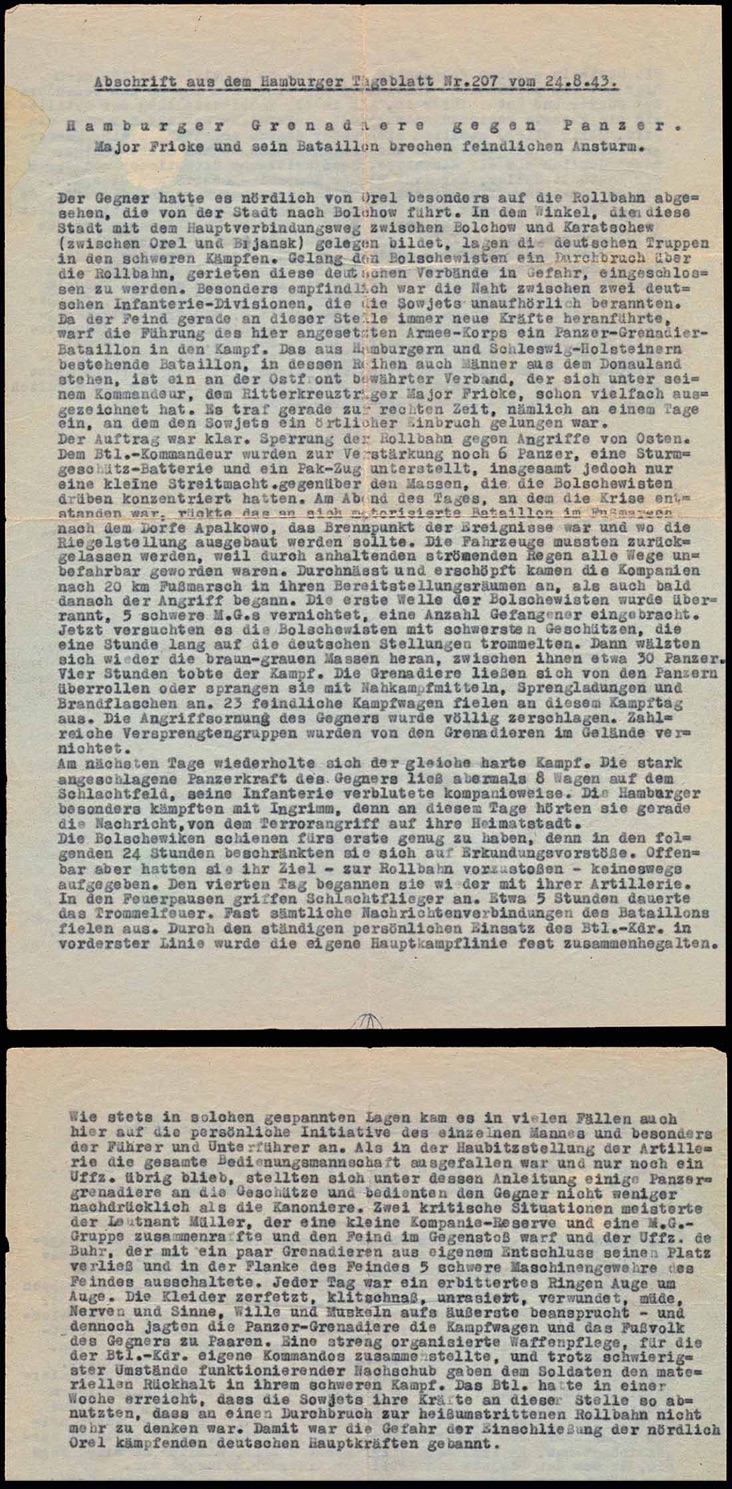
Battle Report, 24 August 1943

Copy from the Hamburger Tageblatt
Hamburger grenadiers against tanks
Major Fricke and his battalion succeed against enemy attack
North of OREL the enemy was eager to take the “Rollbahn” main route which goes from the city to BOLSCOW. The German troops are engaged in heavy fights out of a site, situated in an angle which is created by that city and the main road, between BOLSCOW and KARSTSCHEW (between OREL and BRJANSK). Had the Bolschewisten success in braking through via the (Rollbahn) main route the German troops would have been endangered to be enclosed. Especially sensitive was the seam between two GERMAN infantry divisions which were attacked by the Soviets continuously.
Because the enemy added new forces continuously at this site, the lead of the Armee-Korps responsible, brought in a Panzer Grenadier Battallion to fight. The battalion commanded by Major Fricks –a Ritterkreuzträger, reputedly distinguished- consisting out of Hamburger, Schleswig Holsteiner plus men out of the Donauland who had proven success at the East Front. His arrival was timed perfectly, at a day, when the Soviets achieved a local break through. (or penetrated the German lines locally)
The mission was clear.. Blocking the Rollbahn against attacks from the east.
As reinforcement, 6 tanks, one Sturmgeschütz – batterie (assault gun batterie) and a Pak Zug were added. However it was still a small force against the Bolschewist masses, which were concentrated over there.
In the evening of the crisis the battalion approached the village of Apalkowo the center of the events. Here the bolt of defense (Riegelstellung) should be established.
The vehicles had to be left behind because of endless pouring rain.
After 20 kilometers of marching, they arrived their site of defense, soggy and tired.
Shortly later the attack started. The first wave of the Bolschewisten where overrun.
5 heavy machine guns were destroyed, a number of prisoners had been taken. Now, the Bolschewisten tried heavy artillery. One hour they hit the German sites. Then, the brown grey masses attacked, accompanied by 30 tanks. Four hours lasted the battle. The grenadiers let them roll over by the tanks, or attacked using close combat means, explosives and flame throwers. 23 enemy vehicles were destroyed. The enemy attack morale was eliminated. Numerous lost enemy groups were killed.
Next day, the same tough battle repeated. The reduced enemy tank force left again 8 destroyed vehicles on the battlefield, the enemy infantry bled to death (kompanieweise) company by company. The Hamburger fought with furor because they just learned about a terrorist attack at their hometown. Looks like the Bolshevists had it for now, because during the next 24 hours they just sent reconnaissance groups. However they still wanted to take control over the Rollbahn.
On the fourth day they started again using their artillery. During fire break, battle aircraft attacked. About 5 hours lasted the (trommelfeuer) continuous enemy fire.
Nearly all communication connections of the battalion were destroyed.
Because of the personal engagement of the commanding officer in the frontal areas, his own main battle line (Hauptkampflinie) was kept intact.
As always in situations like these, success is based on the individual person, the leaders and sub leaders. After the crew of a heavy gun had been eliminated, the average grenadiers took over and fired successfully.
Two critical situation were solved by Lieutenant Müller who brought a small group together and defeated the enemy. Or sergeant de Bahr, who left his own site, attacked with a few grenadiers into the enemy flank and destroyed 5 heavy machine guns. Every day was a bitter fight, eye to eye. Their uniforms ragged, totally soaked, unshaved, injured, tired. Nerves and sins, will and muscles, totally alert. Nevertheless, they chased the tanks and the grenadiers. The commanding officer organized a special unit only to clean and repair weapons, which helped the fighting soldiers to succeed. The battalion achieved within a week their mission, to hinder the Sowjets to take the Rollbahn and control it. Therefore, the danger for the troops fighting north of OREL to be enclosed had been eliminated.